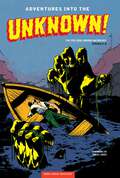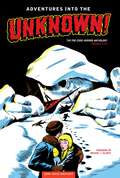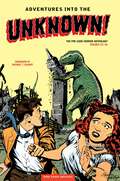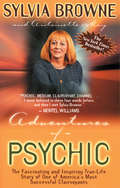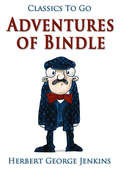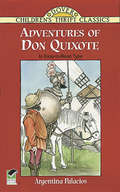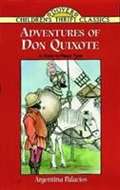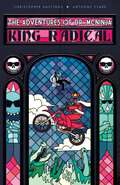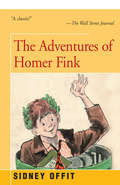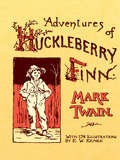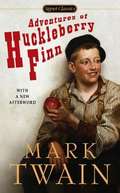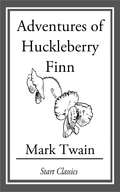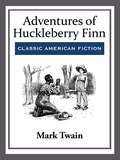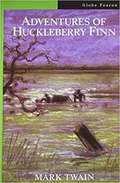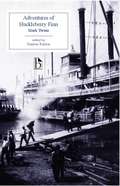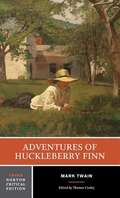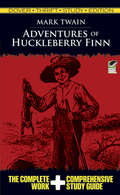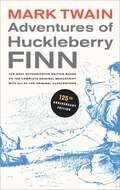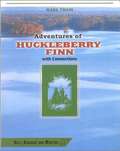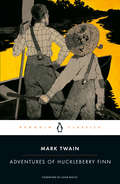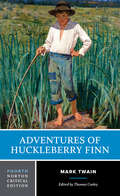- Table View
- List View
Adventures into the Unknown Archives Volume 2
by VariousCursed phantoms and enraged apparitions haunt the pages ofAdventures into the Unknown!—the first ongoing comics anthology of supernatural horror! Dark Horse&’s deluxe hardcover collects issues #5-#8 of this strange series. Featuring Golden Age talents like Jon L. Blummer, Tarzan newspaper strip illustrators Bob Lubbers and John Celardo, and horror legend Johnny Craig.* Foreword by horror writer Bruce Jones!
Adventures into the Unknown Archives Volume 3
by VariousFrom storm-battered castles to secret laboratories, the golden age supernatural anthology Adventures into the Unknown! had every spooky setting audiences could desire! Eminent illustrators Ogden Whitney, Bob Lubbers, John Celardo, Lin Streeter, and others deliver some classic pre-Code horror stories. Collecting issues #9-#12, this deluxe hardcover also includes an introductory essay by Michael T. Gilbert.* The rare and expensive comics are finally collected!* Featuring classic work by Ogden Whitney!
Adventures into the Unknown Archives Volume 4
by VariousFrom storm-battered castles to secret laboratories to the oceans' depths, the golden age supernatural anthology comic Adventures Into the Unknown had every spooky setting audiences could desire and Dark Horse is collecting them all into deluxe hardcover archive editions! A classic cover by Ogden Whitney sets the tone for our fourth excursion into the quirky realms found in Adventures into the Unknown! Enjoy "Beware the Jabberwock," "The Ghost that Didn't Die," and an excellent cover run by Whitney--as well as a plethora twisted tales! Classic monsters, convoluted crises, and ghosts of all sorts populate these entertaining stories from the early 1950s, with contributors including Fred Guardineer, Lin Streeter, Charles Sultan, and others. This volume features a new foreword by comic-book historian and Mr. Monster creator Michael T. Gilbert, as well as all original text pieces and letter columns!
Adventures of A Psychic: The Fascinating And Inspiring True-life Story Of One Of America's Most Successful Clairvoyants (Signet Ser.)
by Sylvia Browne Antoinette MayIn this uniquely fascinating book, world-renowned psychic Sylvia Browne recounts her captivating life as a clairvoyant, telling of her earliest "readings" as a young child in Kansas City, and of her first contact with "Francine," her spirit guide. In engrossing detail, Sylvia tells how her "gift" has assisted police departments in their search for missing children and dangerous criminals—and how her predictions of deaths, plane crashes, and momentous world events were sometimes heeded—or tragically ignored. But more than anything else, this is the remarkable story of one woman’s psychic odyssey, for it offers illuminating insight into how we can better understand ourselves and our own psychic abilities. ADVENTURES OF A PSYCHIC may give you an entirely new outlook on life, death, psychic phenomena, and the "other side!"
Adventures of Bindle: Revised Edition Of Original Version (Classics To Go)
by Herbert George JenkinsHerbert George Jenkins (1876 – 8 June 1923) was a British writer and the owner of the publishing company Herbert Jenkins Ltd. which published many of P. G. Wodehouse's novels. As was the norm at the time, many of his fictional works appeared first in pulp magazines. Two of his novels and several of his short stories were made into short movies. (Excerpt from Wikipedia)
Adventures of Don Quixote (Amplify Core Knowledge Language Arts Activity Book)
by Amplify LearningUnit 4 is centered around an adapted version of Don Quixote paired with Miguel de Cervantes's Adventures of Don Quixote.
Adventures of Don Quixote (Dover Children's Thrift Classics)
by Argentina Palacios"Once, there was a man who went crazy from too much reading. He only read books about knighthood; that was the problem." So begins this charming retelling of Don Quixote de la Mancha, one of the most entertaining books ever written. Young people will delight in the hilarious adventures of the idealistic would-be knight and his "squire," Sancho Panza, as they set out to right the wrongs of the world. Ms. Palacios, a talented storyteller, captures all the flavor and irony of the original as the two heroes ride forth to conquer evil. Along the way the well-meaning but addled knight-errand mistakes a miserable inn and its keeper for a castle and its lord; imagines an ordinary peasant girl to be the noble lady Dulcinea, perceives windmills as giants to be overcome, and gets enmeshed in other cases of mistaken identity. These, and many more incidents and adventures are retold here in a beguiling, easy-to-read version, enhanced by six new black-and-white illustrations by Thea Kliros. This edition is sure to delight today's youngsters, just as the original has enchanted countless readers since its publication nearly 400 years ago.
Adventures of Don Quixote: Activity Book (Amplify Core Knowledge Language Arts, Grade 5 #Unit 4)
by Amplify EducationNIMAC-sourced textbook
Adventures of Don Quixote: New Edition, With Engravings From Designs By Richard Westall, Volume 2
by Miguel de Cervantes Saavedra Argentina PalaciosNIMAC-sourced textbook
Adventures of Don Quixote: Translated From The Spanish (classic Reprint) (Dover Children's Thrift Classics Ser.)
by Miguel de Cervantes Saavedra Argentina Palacios"Once, there was a man who went crazy from too much reading. He only read books about knighthood; that was the problem." <P><P>So begins this charming retelling of Don Quixote de la Mancha, one of the most entertaining books ever written. Young people will delight in the hilarious adventures of the idealistic would-be knight and his "squire," Sancho Panza, as they set out to right the wrongs of the world. <P><P>Ms. Palacios, a talented storyteller, captures all the flavor and irony of the original as the two heroes ride forth to conquer evil. Along the way the well-meaning but addled knight-errand mistakes a miserable inn and its keeper for a castle and its lord; imagines an ordinary peasant girl to be the noble lady Dulcinea, perceives windmills as giants to be overcome, and gets enmeshed in other cases of mistaken identity. These, and many more incidents and adventures are retold here in a beguiling, easy-to-read version, enhanced by six new black-and-white illustrations by Thea Kliros. <P><P>This edition is sure to delight today's youngsters, just as the original has enchanted countless readers since its publication nearly 400 years ago.
Adventures of Dr. McNinja, The: King Radical
by Christopher HastingsWhen everyone thinks Dr. McNinja is killed by a vengeful astronaut ghost, it's his chance to infiltrate the criminal organization of King Radical. But should he who fights rad monsters beware of becoming one himself?
Adventures of Homer Fink
by Paul Galdone Sidney OffitHomer Fink could speak Latin and Greek or chart the orbit of the planet Jupiter, but when it came to tying his shoelaces or knotting his tie Homer was helpless. The Adventures of Homer Fink is a story of youth's first awareness of power and philosophy and love. It is peopled with characters as real as your next-door neighbors and yet uniquely extraordinary. Above all, this is a tale full of humor and affection and the wonder of growing up.
Adventures of Huckleberry Finn
by Mark Twain E. W. KembleReferring to Adventures of Huckleberry Finn, H. L. Mencken noted that his discovery of this classic American novel was "the most stupendous event of my whole life"; Ernest Hemingway declared that "all modern American literature stems from this one book," while T. S. Eliot called Huck "one of the permanent symbolic figures of fiction, not unworthy to take a place with Ulysses, Faust, Don Quixote, Don Juan, Hamlet."The novel's preeminence derives from its wonderfully imaginative re-creation of boyhood adventures along the mighty Mississippi River, its inspired characterization, the author's remarkable ear for dialogue, and the book's understated development of serious underlying themes: "natural" man versus "civilized" society, the evils of slavery, the innate value and dignity of human beings, the stultifying effects of convention, and other topics. But most of all, Adventures of Huckleberry Finn is a wonderful story ― filled with high adventure and unforgettable characters (including the great river itself) ― that no one who has read it will ever forget.
Adventures of Huckleberry Finn
by Mark Twain Jayne Anne Phillips Padgett PowellThe adventure of a lifetime Tom Sawyeras pal Huck Finn finds himself on the run, floating down the Mississippi with Jim, a runaway slave. With rich description as well as sharp satire, Twain vividly recreates the world he knew as a child.
Adventures of Huckleberry Finn
by Mark TwainClimb aboard the raft with Huck and Jim and drift away from the "sivilized" life and into a world of adventure, excitement, danger, and self-discovery. Huck's shrewd and humorous narrative is complemented by lyrical descriptions of the Mississippi valley and a sparkling cast of memorable characters.
Adventures of Huckleberry Finn
by Mark TwainYou don't know about me without you have read a book by the name of The Adventures of Tom Sawyer; but that ain't no matter. That book was made by Mr. Mark Twain, and he told the truth, mainly. There was things which he stretched, but mainly he told the truth. That is nothing. I never seen anybody but lied one time or another, without it was Aunt Polly, or the widow, or maybe Mary. Aunt Polly-Tom's Aunt Polly, she is-and Mary, and the Widow Douglas is all told about in that book, which is mostly a true book, with some stretchers, as I said before. A Timeless Classic!
Adventures of Huckleberry Finn
by Mark TwainThis classic series of plays, novels, and stories has been adapted, in a friendly format, for students reading at various levels.
Adventures of Huckleberry Finn (Broadview Editions)
by Mark Twain Stephen RailtonSamuel Clemens was born in 1835, on the last day of November, in Florida, Missouri. This small, obscure village near the middle of the United States was the starting point for a life of world-wide travel and fame. At age four his family moved to Hannibal, a slightly larger town on the western bank of the great Mississippi River. This was the place to which his imagination would later most often return, but at seventeen he ran away from it to look for his future in larger places. He worked as a typesetter in the East, a riverboat pilot between St. Louis and New Orleans, and a prospector and a reporter in the far West before discovering, on the verge of his thirtieth birthday, that his "call," as he put it in a letter to his family, was "to literature of a low order--i.e. humorous."1 After 1865 he lived alternately in eastern cities such as Buffalo, Hartford, and New York, in various places in Europe, including London, Paris, Vienna, and Florence, and on the road, as a touring lecturer and a travel writer gathering material. As a best-selling author and popular humorist he made a fortune, but never had enough money to satisfy his own ambitions. Over the years he spent more of his time and energy, and too much of his literary earnings, in a series of investments and speculations that promised to make him fabulously rich but instead, in 1894, during one of the American economy's periodic downturns, led to a well-publicized bankruptcy. To repay his creditors, he undertook a lecture tour around the world; the attention and laughter that greeted him wherever he went firmly established his status as America's first international celebrity. Though he was on intimate terms with presidents and corporate tycoons, and received honorary degrees from prestigious universities, common people saw him as one of them. Grateful for the pleasure he had given them, a huge audience shared in his triumphs and sympathized with his tragedies. These included the deaths of three of his four children and of his beloved wife, Olivia Langdon. He called her Livy; she called him Youth. He died on 21 April 1910, in Redding, Connecticut.
Adventures of Huckleberry Finn (Norton Critical Editions)
by Mark TwainThis perennially popular Norton Critical Edition reprints for the first time the definitive Iowa-California text of Adventures of Huckleberry Finn, complete with all original illustrations by Edward Windsor Kemble and John Harley. The text is accompanied by explanatory annotations. <p><p> "Contexts and Sources" provides readers with a rich selection of documents related to the historical background, language, composition, sale, reception, and newly discovered first half of the manuscript of Mark Twain's greatest work. Included are letters on the writing of the novel, excerpts from the author's autobiography, samples of bad poetry that inspired his satire (including an effort by young Sam Clemens himself), a section on the censorship of Adventures of Huckleberry Finn by schools and libraries over a hundred-year period, and commentary by David Carkeet on dialects of the book and by Earl F. Briden on its "racist" illustrations. In addition, this section reprints the full texts of both "Sociable Jimmy," upon which is based the controversial theory that Huck speaks in a "black voice," and "A True Story, Repeated Word for Word As I Heard It," the first significant attempt by Mark Twain to capture the speech of an African American in print. <p> "Criticism" of Adventures of Huckleberry Finn is divided into "Early Responses" (including the first negative review) and "Modern Views" by Victor A. Doyno, T. S. Eliot, Jane Smiley, David L. Smith, Shelley Fisher Fishkin (the "black voice" thesis), James R. Kincaid (a rebuttal of Fishkin), and David R. Sewell. Also included is Toni Morrison's moving personal "Introduction" to the troubling experience of reading and re-reading Mark Twain's masterpiece.
Adventures of Huckleberry Finn Thrift Study Edition
by Mark Twain"All modern American literature comes from one book by Mark Twain called Huckleberry Finn. It's the best book we've had," declared Ernest Hemingway. Millions of readers around the world would agree, having climbed aboard the raft with young Huck and Jim, the runaway slave, to drift along the Mississippi on a voyage of adventure and self-discovery. This economical two-part edition includes the complete text of Twain's classic novel plus a student-friendly study guide. Created to help the reader quickly gain a thorough understanding of the content and context of Huckleberry Finn, the guide includes: * Chapter-by-chapter summaries* Explanations and discussions of the plot* Question-and-answer sections* Mark Twain biography* List of characters and more Dover Thrift Study Editions feature everything that students need to undertake a confident reading of a classic text, as well as to prepare themselves for class discussions, essays, and exams.
Adventures of Huckleberry Finn, 125th Anniversary Edition: The only authoritative text based on the complete, original manuscript (Mark Twain Library #9)
by Mark TwainThis 125th Anniversary edition of Adventures of Huckleberry Finn is expanded with updated notes and references and a selection of original documents—letters, advertisements, playbills—some never before published, from Twain's first "book tour" to promote its original publication. This is the only edition of Twain's masterpiece based on his complete manuscript, including the 663 pages found in a Los Angeles attic in 1990. It includes all of the illustrations commissioned by Mark Twain, historical notes, a glossary, maps, and selected manuscripts.
Adventures of Huckleberry Finn, with Connections
by Mark TwainThe Adventures of Huckleberry Finn is written entirely in dialect. Readers meet Huckleberry Finn after he's been taken in by Widow Douglas and her sister, Miss Watson, who intend to teach him religion and proper manners. Huck soon sets off on an adventure to help the widow's slave, Jim, escape up the Mississippi to the free states. By allowing Huck to tell his own story, Mark Twain addresses America's painful contradiction of racism and segregation in a "free" and "equal" society.
Adventures of Huckleberry Finn: New Edition - Adventures Of Huckleberry Finn By Mark Twain
by Mark Twain Azar Nafisi R. Kent RasmussenThis new edition of Huckleberry Finn, based on the recently discovered original handwritten manuscript, is destined to become the standard of this American classic. The volume inclues a discussion by Professor Victor Doyno, President of the Twain Circle and the author of a definitive book about the composition of this great novel, who will also conduct interviews across the country. Illustrations. (Literature)
Adventures of Huckleberry Finn: New Edition - Adventures Of Huckleberry Finn By Mark Twain (Norton Critical Editions #0)
by Mark Twain“I LOVE this book, as a reader, and I always enjoy teaching it. In the midst of current conversations and conflicts (Black Lives Matter and the responses to it, for example), its importance as a truly ‘American’ novel only grows.” —Anita Guynn, University of North Carolina at Pembroke This Norton Critical Edition includes: The American first edition text, plus the reinstated “raft passage” from Life on the Mississippi (1883), complete with all original illustrations by Edward Windsor Kemble and, for the raft passage, John Harley. Editorial matter by Thomas Cooley. A rich selection of contextual and source documents centered on the novel’s historical background, language, composition, and reception, four of them new to the Fourth Edition. Seventeen carefully chosen critical assessments of Mark Twain’s greatest work, ten of them new to the Fourth Edition. A chronology and a selected bibliography. About the Series Read by more than 12 million students over fifty-five years, Norton Critical Editions set the standard for apparatus that is right for undergraduate readers. The three-part format—annotated text, contexts, and criticism—helps students to better understand, analyze, and appreciate the literature, while opening a wide range of teaching possibilities for instructors. Whether in print or in digital format, Norton Critical Editions provide all the resources students need. “The materials and notations were excellent and useful. They often lead the students to further inquiry. It is a valuable text.” —Michael W. Carter, University of Kentucky “I have generally found the editorial annotations excellent. Overall I still find this the best critical edition of Huck Finn for my students.” —Shelly Jarenski, University of Michigan–Dearborn
